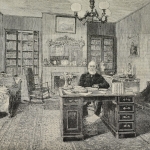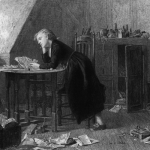Pilgrim feet, pray whither bound?
Pilgrim eyes, pray whither bent?
Sandal-shod and travel-gowned,
Lo, I seek the way they went
Late who passed toward Holy Land.
Pilgrim, it was long ago;
None remains who saw that band;
Grass and forest overgrow
Every path their footing wore.
Men are wise; they seek no more
Roads that lead to Holy Land.
Proud his look, as who should say:
I shall find where lies the way.
Pilgrim, thou art fair of face,
Staff and scrip are not for thee;
Gentle pilgrim, of thy grace,
Leave thy quest, and bide with me.
Love shall serve thee, joy shall bless;
Thou wert made for tenderness:
God's green world is fair and sweet;
Not o'er sea and Eastern strand,
But where friend and lover meet
Lies the way to Holy Land.
Low his voice, his lashes wet:
One day if god will—not yet.
Pilgrim, pardon me and heed.
Men of old who took that way
Went for fame of goodly deed,
Or, if sooth the stories say,
Sandalled priest, or knight in selle,
Flying each in pain and hate,
Harassed by stout fiends of hell,
Sought his crime to expiate.
Prithee, Pilgrim, go not hence;
Clear thy brow, and white thy hand,
What shouldst thou with penitence?
Wherefore seek to Holy Land?
Stern the whisper on his lip:
Sin and shame are in my scrip.
Pilgrim, pass, since it must be;
Take thy staff, and have thy will;
Prayer and love shall follow thee;
I will watch thee o'er the hill.
What thy fortune God doth know;
By what paths thy feet must go.
Far and dim the distance lies,
Yet my spirit prophesies:
Not in vigil lone and late,
Bowed upon the tropic sand,
But within the city gate,
In the struggle of the street,
Suddenly thine eyes shall meet
His whose look is Holy Land.
Smiled the pilgrim, sad and sage:
Long must be my pilgrimage.


















Comment form: